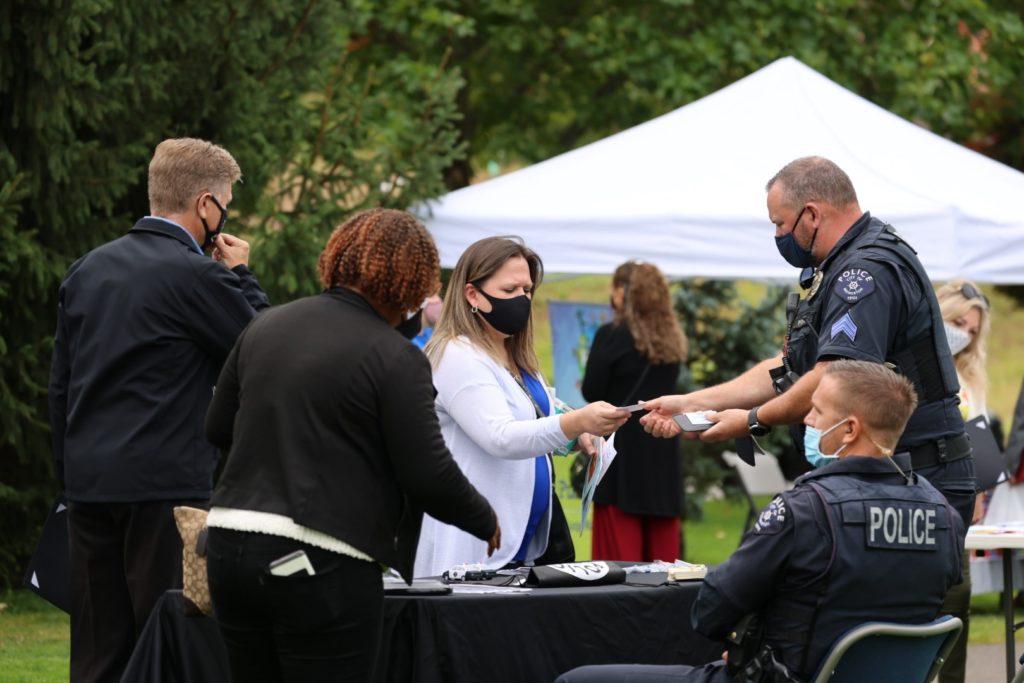Dear Friends and Neighbors,
The legislative session is rolling along. This week is the house of origin policy committee cutoff week. With over 2,000 bills introduced in the House, we want to be sure that any bills we pass are given the attention and careful consideration they deserve— that’s where legislative cutoffs come into play.
Legislative cutoffs are milestones bills need to reach by certain dates in order to receive further consideration. Any bills that don’t make it to these milestones will need to wait until the next legislative session to continue the process or be reintroduced at the start of a new biennium. House bills that are not approved by House policy committees by Feb. 3 (or Feb. 7 for fiscal committees) will need to be reintroduced next year. Any House bills that fail to be approved by a vote on the House Floor by Feb. 15, will also need to be reintroduced.
View the 2022 Session cutoff calendar on the Legislature’s website.
Supporting Our Healthcare Heroes with Safe Staffing Standards

Our nurses and front-line healthcare workers have moved mountains over the last two years, but they are burning out. A December poll found that 84 percent of healthcare workers said they were burned out and 49 percent said they are likely to quit healthcare. When asked the reasons for considering leaving the profession, 71 percent cited staffing shortages as a major issue.
As a former nurse, I can attest that short-staffing has been an issue at hospitals for far longer than the pandemic. I remember how demoralizing it was to know that you could not give your patients the care they deserved because you simply had too many patients to give adequate care to. Hospital executives have been able to find millions of dollars to pay themselves bonuses during this pandemic. We must ensure that healthcare workers and patients are protected from unmanageable patient loads.
That is why I am supporting legislation to create new safe staffing standards for hospitals in Washington. HB 1868 will make Washington the second state in the nation to mandate safe staffing ratios at hospitals. By mandating manageable patient loads, we can protect healthcare workers and ensure that patients get the care they need. The bill also ends mandatory overtime policies and puts protections in place to ensure that rest and meal breaks are respected.
Safe staffing standards will protect our healthcare workers and ensure that hospitals are prepared for emergencies. Washington should be a place where healthcare workers can have long and successful careers. Ultimately, by protecting them we are also protecting ourselves by ensuring patients can get the care they deserve.
Supporting Our Local Community
The Legislature passes two-year budgets every odd-numbered year. During the even-numbered years, we pass supplemental budgets that adjust the two-year budgets and give us another chance to support our community. This year I am working to support organizations that make a difference across the Kitsap Peninsula.
Poulsbo Fire CARES

When someone is suffering from a behavioral health crisis, oftentimes an armed law enforcement response only serves to escalate the situation. To help de-escalate situations, the Legislature has encouraged the creation of mobile integrated health response units that are trained in crisis intervention and behavioral health. Fire CARES is a partnership between the Poulsbo Fire Department, the City of Poulsbo, and the Olympic Peninsula Community Clinic that responds to people suffering from behavioral health issues and helps them navigate the situation. Fire CARES is staffed by a firefighter/EMT trained in crisis intervention and a behavioral health professional. I am proud to be working with the Poulsbo Fire Department to request funding in the state operating budget to expand the reach of the Fire CARES team. The Fire CARES team improves outcomes, reduces costs, and helps individuals who have difficulty accessing care. You can learn more about the Fire CARES team here.
Habitat for Humanity of Kitsap County

Habitat for Humanity helps build strength, stability, and self-reliance by building affordable homes for the Kitsap County community. Kitsap Habitat has emphasized the building of communities, like New Hope Circle, where Habitat homeowners and volunteers have helped build a seventeen home neighborhood. This year, I am requesting funding from the state operating budget to help Habitat expand programs to assist low-income families and to fund training programs for youth. Youthbuild uses the construction process to build connections between homeowner families, volunteers, and the community.
YWCA A.L.I.V.E. Emergency Shelter Program

The YWCA A.L.I.V.E. (Alternatives to Living In a Violent Situation) Emergency Shelter Program is a vital escape for survivor of domestic violence and their children who are fleeing an immediately dangerous domestic violence situation. The program provides emergency shelter, case management, housing advocacy, child care, mental health services, and other referrals to resources. This program saves the lives of domestic violence survivors and is a vital resource for our community. I am partnering with the YWCA to ensure that the A.L.I.V.E. shelter has funding for 2023 and is available to help those in our community when they need it.
Silverdale Chamber of Commerce

The pandemic has hit small businesses especially hard. Keeping our community safe has come at a big cost to many small businesses. That is why I am partnering with the Silverdale Chamber of Commerce to request funding for a small business grant program to help keep small business owners on their feet. Small businesses are the heart of our community and I am happy to be working with the Silverdale Chamber to provide some relief.
Police Accountability Implementation and Clarification

Last year the Legislature passed a package of bills designed to improve trust between law enforcement and the community and to uphold the policing profession. These laws work together to establish clear expectations for the behavior of police officers: to define what is an acceptable use of force; what tactics and equipment are permitted; and to make sure that misconduct is held accountable.
Since this legislation went into effect a few months ago, we have heard concerns and confusion from police, from mental health professionals and from the public that these new laws might be restricting what police can do, especially in trying to help people suffering from mental health crises.
Members from the House Public Safety Committee have spent the last few months meeting with law enforcement leaders, rank and file officers, designated crisis responders, mental and behavioral health professionals, firefighters, EMTs, cities, and counties to gather feedback and ensure that our officers have the clarity necessary to do their jobs. As a result of these discussions, the House of Representatives has passed two bills to clarify portions of the new laws.
HB 1735 clarifies that officers can use force, subject to the newly established reasonable care standard, in behavioral health circumstances, for involuntary treatment commitments, in instances of child welfare, and other related circumstances. While the new use of force standard never made any changes to these statutes, some law enforcement agencies contend that it prevents them from assisting designated crisis responders and mental and behavioral health specialists with involuntary treatments and other community caretaking functions. Regrettably, this has caused some law enforcement agencies to stop responding to community caretaking calls altogether. HB 1735 ensures that officers have the certainty they need to respond to community caretaking calls.
The second bill, HB 1719, amends the ban on .50 caliber firearms to only apply to .50 caliber rifles and not less-lethal ammunition that may be greater than .50 caliber or the devices that fire them. Some law enforcement agencies had discontinued the use of these devices because they feared they might violate the ban on .50 caliber firearms. With these tweaks to the law, I am confident that our dedicated law enforcement professionals will be able to prioritize de-escalation and less-lethal alternatives to deadly force while providing everyone in our community with the public safety they expect and deserve.
Sincerely,
![]()
Rep. Tarra Simmons
